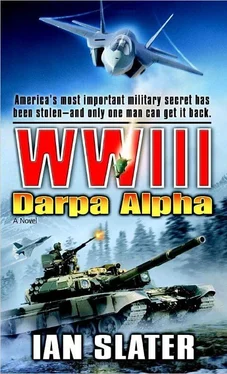“Is it finished?”
“Almost. One more month. Maybe less. There is much blasting by the Koreans but this delays assembly and our three big bosses in ABC—” He indicated the H-block he’d crudely drawn sitting ninety feet above where the tunnels began. “—They are not so interested in making exit for workers, only making more missiles to sell.”
“To sell to terrorists !” Freeman charged.
“Yes,” said Ilya, looking more chagrined than sorry. The Russian moved his map of the three tunnels around for Johnny Lee to get a better view, thus affirming his cooperative spirit.
“He’s telling us,” Lee told Freeman, “that many of the parts for the weaponry are stacked in the interconnecting tunnels, and no smoking is allowed in any of the tunnels.”
“Now,” Freeman told Ilya softly, his tone nevertheless pregnant with authority, “draw the way in through the minefield. You’ll be in the front vehicle, comrade!”
Ilya flinched, so did Freeman, as another arty battery opened up, sending more freight train rounds on their mission to kill U.S. marines. Freeman glanced at his watch. If Thomas, Kegg, and the other two marines, including the corporal, didn’t return in ten minutes, he was going to break cover and go after ABC’s armor. Unless the tank was disabled, the second helo wave, as well as his and Tibbet’s marines already on the ground, was doomed. Like so many plans he’d seen in civilian and military life, everything, as the academics at staff college sometimes said, “was in a state of flux” or, as Aussie succinctly put it, “everything was going to rat shit.”
* * *
The snow was falling even more heavily now and there was still no sign of Melissa Thomas, Kegg, the other marine, and the corporal, or enemy armor. It was as if everything had been swallowed up in what was now a full-blown blizzard, the wood as silent as a tomb, Freeman’s team and Chester’s marines statuelike in the swirling whiteness. Even the sound of the small-arms fire and the occasional scream of Russian MANPADs, which the Russians were using as ground-to-ground munitions in the absence of any discernible radar signatures in the air, were muted. Many of Colonel Tibbet’s men had still failed to link up due to the erratically spaced landings the big Stallions had been forced to make due to the Cobras’ sudden midair collision. To further discombobulate the Americans, the Russians had affixed a small, thimblesized Stuka screamer to their artillery rounds and some of their missiles, designed, as had been the Nazi prototype, to instill ice-cold terror into their potential victims. The first time he heard it, Freeman immediately recalled the stories of his great-grandfather, who had served as a liaison officer in the American International Brigade during the Spanish Civil War of 1936–39, about how the inhabitants of Guernica had been the first nonmilitary target in history to be flattened by the Luftwaffe, Goering’s air force, practicing on the unarmed civilians of the town as a curtain raiser to the Nazis’ blitzkrieg — lightning war — that began World War II.
The sound of a broad front battle had dropped off from the more or less sustained ripping noise of machine gun fire, guttural roars of big Triple A, and the high-pitched screaming of the heat-seeking MANPADs, to pockets of noise. These erupted spasmodically from what Freeman guessed were isolated squads of infantry and four-man fire teams, the backbone of the MEU, engaging Russian patrols and gun emplacements, all of which the snow would be covering, helping to camouflage the terrorists’ positions against the attacking marines. Those not engaged in these isolated clashes were in a physical state reminiscent of suspended animation, each marine’s body wound up like an alarm clock, the alarm due to go off at any moment, but no one knowing quite when. Every marine, as well as Freeman’s team, was praying for the arrival of the second wave, but every one of them knew it would be a hard thing for Tibbet to have to send the enciphered message to “come on down,” the old quiz shows’ phrase a current favorite of marine slang, though Melissa Thomas was more often than not the recipient of Oprah Winfrey’s ubiquitous “You go, girl!” a double-edged encouragement thrown at her as she’d struggled to stay afloat in Parris Island’s Water Facility.
While one marine and the marine corporal remained in the Hummer, Thomas and Kegg were kneeling in a natural blind of shoulder-high reeds whose formerly frost-stiffened stalks were now starting to yield to the weight of snow as pea-sized powder crystals gave way to bigger, sloppier flakes that adhered and quickly accumulated on the stalks. Melissa knew that if she and her fire-team buddy Kegg didn’t move soon, the reeds would be bent over by the weight of snow to knee height and lower, and both marines knew that the prone position, in what was now a four-to five-inch snow cover, some drifts back at the wood more than a foot deep, was not the position from which to do any useful recon. Everything in this sector, less than a mile west of the lake, had become unnervingly quiet since the as-yet-unseen tank could no longer be heard.
Marine Thomas, moving her right arm with glacial slowness, had managed to squirt a shot of “defrost” on her rifle’s long thermal-imaging Nite-Sight scope, and knew she had one of the mag’s five 7.62 mm Match Grade rounds already chambered, and the rifle’s trigger weight set for a three-instead of a five-pound pull. She knew that even in good weather a quick shot was often difficult to get off in time, and that in these near-zero-visibility conditions it would be impossible, were it not for the scope’s infrared capacity. All she needed was a heat bleed, a man’s head moving, a blurry-edged white spot against a green background. But she’d never before fired at another human being, and not from five hundred yards. In the abstract, she had no doubt, but now, here, her heart pounding under the stress, the cold, it was the same feeling she’d experienced when first she stood on the edge of the water tank on Parris Island. And choked. “Remember,” Kegg had told her as they’d alighted from the Hummer into the reeds, “the terrorist assholes we’ll be hunting will be trying to take us out before our guys can consolidate and go looking for the H-block. And, shit, it’s their home ground.”
He was right, but she reminded herself the marines had gone over the 3-D computer-generated SATPIX maps of the area ad nauseam, so that, despite the all-but-featureless expanse of the reeds here, west of the lake and less than five miles north of the railhead at Kamen Rybolov, each marine, with his GPS wristwatch, should know where he was.
Though not speaking, Melissa, Kegg, and the two others, by carefully studying their thigh-pocket charts, had estimated that they were less than two miles from the H-block, whose vague outline had shown up on SATPIX, and that the tank they had heard must have stopped, for even given the sound-suppressing quality of snow, the nails-on-chalkboard-like screech of steel treads on steel wheels should have been audible.
Then Melissa heard movement, slight yet distinct, about twenty feet off at two o’clock. Was it a bird, like the one who’d spooked that guy in the reeds who in turn had triggered the anti-personnel mine? Or was it someone moving? And if so, friend or foe? Kegg heard it too, and froze, ready with his M4 5.6 mm carbine. This shortened M16, with grenade launcher attached, was more easily handled in the reeds than an M-10, and Melissa saw the tip of his trigger finger ready to either unleash a 40 mm grenade or fire a flush-out burst of 5.56 mm rounds. But the same questions dogged him: Was it a man or an animal? A mistake could cost you your life or the haunting-till-you-die agony of having initiated a blue-on-blue. Melissa wanted to raise her sniper’s rifle for a quick look through the scope, but that’d be like waving a flag, besides which even the slightest movement would cause the reeds to move. She heard a hissed, “Ga ja!” Kegg saw reeds shivering, and fired, not a profligate hosing of ammo but a marine-style burst, into the middle of the rustle. Melissa fired from the hip, seeing green-white reeds exploding in burnt-brown fragments as her heavy 7.62 mm round tore its path through the vegetation in a nanosecond. For her, however, time morphed into that strange slow motion that danger decrees, when time for those involved irrationally stands still.
Читать дальше












